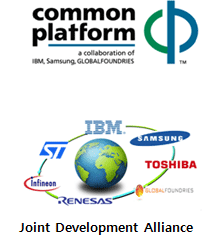As IBM
consolidates the Microelectronics manufacturing with GlobalFoundries, questions
were raised as to whether this would be further divestment of the systems
business and why IBM would pay GlobalFoundries $1.5 billion in cash over the next
three years to take the chip operations off its hands.
In a 10-year
partnership, GlobalFoundries will supply IBM with Power processors in exchange
for access to IBM's intellectual property. That would allow GlobalFoundries to
access key chip making technology and guarantee the chips IBM needs for its systems, like mainframe,
power servers and its Watson data-analytics technology.
IBM Divests Microelectronics To Invest In Systems
IBM
needs “to narrow their focus, get their A-game on, and any distractions from a
core business perspective, such as this deal, need to be put in the rear-view
mirror," FBR
Capital Markets analyst Daniel Ives told Reuters. "From an IBM and investor perspective,
it takes one troubled area out of the core franchise."
The
cost of making chips has risen, and semiconductor development is getting more
complex, making the business less viable.
Besides using its own Power chips, IBM also sold them to game console
manufacturers like Sony, Nintendo and Microsoft. However, IBM still lacks scale and despite
generating $1.4 billion revenue, has $700 million loss in the last year.
According to Ana
Hunter, Vice President of Foundry Services at Samsung, putting together a factory to make the next
generation of semiconductors will cost about $10 billion. Globalfoundries will book around $10bn over the next year in
capital expenditures – which shows you just how expensive it is to compete in
the chip building side of the industry. It
makes sense to consolidate the manufacturing with foundry to pool investments
and risk.
IBM East Fishkill Factory to be transferred to GlobalFoundires
(Image Courtesy of Dutchess County Economic Development Corporation)
Matt Eastwood, an analyst at IDC, said the
deal makes sense because of the changing economics of the semiconductor
manufacturing business. "The cost of semiconductor manufacturing is going
to continue to increase, making it a business where scale will matter more and
more going forward…(GlobalFoundries) also hopes that IBM's focus on growing the
OpenPower ecosystem will create new demand for semiconductor manufacturing
services.”
By
divesting the semiconductor manufacturing business to GlobalFoundries who can scale
up and build Power cores for a wider customer base, IBM will also free up
capital to be reallocated to other areas.
IBM will focus on the research and design of high-end chips, servers and
super-computers. This is part of their
focus on enterprise-class systems innovation.
Arvind Krishna,
General Manager of IBM's Manufacturing & Development
said "Over time, you will get the at-scale manufacturing that actually
assures the longer-term sustainability of these systems," he said.
“This
is another milestone in our journey to transform the IBM Systems and Technology
Group,” said IBM
Senior Vice President, Tom Rosamilia. “The agreement focuses on the
strengths of each company. GlobalFoundries will drive continued leadership in
scale manufacturing becoming our premier supplier of semiconductor technology,
and IBM will continue to create breakthrough R&D innovations that will fuel
the next era of computing systems."
IBM Watson, a cognitive computing built on IBM Power System
IBM’s Commitment to Systems
The systems strategy is clear: “We will continue to be a leader in
high-performance systems, storage and cognitive computing, while continuing to
invest in advanced semiconductor R&D.”
IBM’s research mission is unchanged -- to deliver technology leadership
that differentiates their systems today while continuing the leading edge work
to create the advanced semiconductor technologies of the future.” said
IBM Senior
Vice President, Tom Rosamilia.
Over
the past year, IBM has made bold decisions, steering its portfolio toward world
class systems and technology innovation. The company has
- deployed new cloud and mobile solutions for the mainframe;
- opened the Power architecture to more than 60 members through the OpenPOWER Foundation to expand the use of the architecture;
- invested in software defined storage capabilities and high performance Flash;
- announced investments in the next generation of chip technology,
- developed cognitive computing systems which can help process natural language and unstructured data created by sensors and mobile devices, and
- speed up development of Watsons which is already making impact in areas like personal medicine
All
of these actions reflect IBM's deep commitment to lead in enterprise-class
systems.
"Given
that all the design, all the software, all the operating systems, all of the
firmware and all of the other system advantages that we put in remain with IBM,
my basic answer would be it does not impact our mainframe, or power system or
our storage clients at all," he said.
IBM OpenPower Foundation Members at all layers of the stack
The
OpenPOWER Foundation members are developing their own Power chip for server
applications. Founding members include Google, Samsung, Tyan, nVidia, Mellanox.
Google has also shown an interest in Power
architecture, said Richard Dougherty, founder of analyst firm Envisioneering
Group. While its large-scale data centers run mostly off x86-based systems,
Google has also designed a Power server board.
Google mother board with IBM Power chip
The
highly regarded IBM Research labs, which boasts Nobel Prize winners on staff,
will also continue to rethink and reshape computer design. IBM in July
announced it would pour $3 billion over five years into hardware research that
could lead to quantum computers and cognitive systems that mimic brain
functionality. A brain-like chip was announced in August, and the researchers
have made progress in investigating chip materials beyond silicon. For example, this is a 16-chip version of IBM’s
neurosynaptic (brain-like) computer.
16-chip version of IBM's neurosynaptic (brain-like) computer











